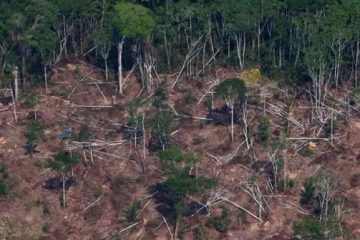Biodiversity contributes considerably to economy and environment
Dr. M. A. BASHAR
 In developing countries, the necessity of publicising services of forests is severely lacking. This sector must be given attention with special emphasis. The country like Bangladesh has to be very serious in all respects to understand and exercise the services offered by the forests. We must remember that the services are very important and useful and they could be made so when and if we become serious about maintenance of forests.
In developing countries, the necessity of publicising services of forests is severely lacking. This sector must be given attention with special emphasis. The country like Bangladesh has to be very serious in all respects to understand and exercise the services offered by the forests. We must remember that the services are very important and useful and they could be made so when and if we become serious about maintenance of forests.
Services of forests are categorised into two broad types. The type 1 includes those services for which a formal market exists or can be developed. These services are: clean water, grazing, ecotourism, recreation, hunting and gathering. The type 2 includes services or functions that are largely intangible and not sold through market. The services are: cultural and spiritual values, influences on climate, erosion control and conservation of biological diversity. This second type of services might be better classified as forest externalities; that is, the services of forest that deliver a welfare benefit but not fully accounted for in price and market systems.
Recently, progress has been made to price and sell several forest-services that were largely non-marketed in the past. For example, the carbon sequestration and storage functions of forests are becoming more “marketable” under new international agreements. Similarly, forest genetic resources, and the associated functions of biological diversity conservation, are increasingly being valued and marketed.
All the above are services of the forest ecosystem. Forest ecosystem is part of the integral ecosystem. Ecosystem diversity is itself one of the components of biodiversity as the components are species diversity, genetic diversity and ecosystem diversity. Services coming from any one of the components of biodiversity are the contributions of biodiversity as a whole to the humans and to the environment. The contribution of biodiversity renders the widespread canopy characteristics of its definition.
Evaluating contribution of biodiversity to national economy needs a widespread practice to define biodiversity in terms of genes, species and ecosystem — corresponding to three fundamental and major components of biological organism. Three major components of biodiversity (genetic diversity, species diversity and ecosystem diversity) have significant contribution to national and global economy. The contribution of biodiversity can be divided into two broad and self-explanatory fields: direct contribution and indirect contribution. The direct contribution of biodiversity essentially concerns marketable commodities and the scale of this contribution is enormous and extremely multifaceted. The direct contributions of biodiversity are in the fields of food, medicine, biological control, industrial materials, recreational harvesting and ecotourism.
Biodiversity directly provides food for humans, which is the foundation of all our food industries and related services. The use of wild species and varieties to supply genes for the improvement of cultivated and domesticated species and replacement of genetic variation in crops and livestock very much influences national as well as global economy. Biodiversity plays a vital role in maintaining the health of human population. More than 60% of the world’s human population relies almost entirely on plant medicine for primary health care. The economic returns of biological control programme can be huge, with the monetary values of annual gains in food or other crop production perhaps exceeding by many times the entire investment in control programmes.
Biodiversity contributes directly in national economy through industrial materials including building materials, fibres, dyes, resins, gums, adhesives, rubber, oils and waxes, agricultural chemicals and perfumes. Multifarious recreational harvesting including hunting and fishing as well as harvesting of plants and animals is of huge commercial value for trade. Tourism as a whole is one of the fastest growing industries in the world. Ecotourism directly depends on biodiversity and it can be of huge economic significance at national and global level.
The indirect contribution of biodiversity are the services that are crucial to human wellbeing. This type of contribution is more difficult to quantify or value than direct contribution and in some cases it may be difficult to recognise. It should be a relationship between biodiversity and ecosystem functioning.
Biodiversity deals with production of biomass in any region of the biosphere and this is the speciality of biodiversity and biodiversity conservation. Biodiversity is structured by the practicality of biodiversity conservation as well. Biodiversity conservation ensures augmentation of species richness and species assemblage in an ecosystem. When species richness in plant-kingdom increases in an ecosystem, the increase of interactions between both biotic-biotic and biotic-abiotic factors is ensured. These interactions are key to creating ecosystem services. Then the ecosystem becomes strong enough to provide good services to humans and environment. And that is why biodiversity contributes both to the economy and environmental soundness in the area where it remains in sustainable status.
It happens that when biodiversity provides an increase of species richness in plant kingdom, it creates opportunities for conversion of more abiotic energy into biotic molecules; and then biomass production increases. The increased biomass production contributes fruitful ecosystem-services both to economy and environmental functioning through the successive trophic levels. These contributions are natural and do not have any side impact on environment. Because of the fact, biodiversity can contribute towards increase in renewable energy in a better way than any other physical resources.
Services of biodiversity are the services of ecosystem functions that stand essential for human life and economic well-being, such as waste breakdown, climate regulation, erosion control, etc. These can be further categorised as regulating, supporting, and provisioning services of nature or forest towards contributions of biodiversity in economy and in the nature conservation as well.
The writer is Professor, Department of Zoology and Former Dean, Faculty of Biological Sciences, University of Dhaka.
Article originally published on The Daily Star





